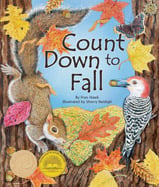Alignment to Standards for OK

| Grade | Number | Standard |
|---|---|---|
| 1 | SC-1)1:1. | Objects have properties that can be observed, described, and measured. |
| 1 | SC-1)1:2. | Using the five senses, objects can be grouped or ordered by physical properties. |
| 1 | SC-1)3:2. | Weather changes from day to day and over the seasons. Weather can be observed by measuring temperature and describing cloud formations. |
| 1 | SS-1)5.1. | Describe how people get their basic needs of food, clothing, and shelter (e.g., make/grow their own, trade with others for what they need, and earn money to buy the things they need). |
| 2 | SC-2)1:1. | Objects can be described in terms of the materials of which they are made. Physical properties of materials can be changed by tearing, sifting, sanding, or pounding. |
| 3 | SC-3)2:1. | Plants and animals have features (i.e., breathing structures, limbs, skin covering, seed dispersal, roots, stems, and leaves) that help them live in environments such as air, water, or land. |
| 3 | SC-3)2:2. | Each plant or animal has different structures that serve different functions in growth and survival (i.e., the way it moves, type of food it needs, and where it lives). |
| 3 | SC-3)2:3. | All animals depend on plants. Some animals eat plants for food. Other animals eat animals that eat the plants. |
| 4 | SC-4)3:2. | Living organisms can be classified using various characteristics (e.g., habitats, anatomy, behaviors). |
| 4 | SC-4)3:3. | Many observable characteristics of an organism, such as the color of flowers or the number of limbs on an animal, are inherited from the parents of the organisms. |
| 5 | SC-5)2:1. | Organisms depend on each other for food, shelter, and reproduction. |
| 5 | SC-5)3:2. | Weather exhibits daily and seasonal patterns (i.e., air temperature, cloud type, wind direction, wind speed, and precipitation). |
| 5 | SC5)4:2. | Recognize and describe patterns, then make predictions based on patterns. |
| K | SC-K)1.1. | Observe, describe, sort, and classify the sensory attributes of objects according to taste, smell, hearing, touch, and sight. |
| K | SC-K)2.3. | Observe and describe how animals move (e.g., walk, crawl, hop, fly). |
| K | SC-K)3.3. | characteristics of the four seasons (e.g., temperature, weather, appropriate clothing, changing leaves). |
| K | SCK)1.1. | Observe, describe, sort and classify objects according to their common properties (e.g., animals, plants, shells, rocks, buttons). ??? |
| PK | SC-PK)1.1. | Develops increasing abilities to classify, compare, and contrast objects, events and experiences. |
| PK | SC-PK)2.2. | Develops an awareness of the properties of some objects (e.g., float-sink, heavy-light, rough-smooth, hard-soft, magnetic-nonmagnetic, solid-liquid, wet-dry). |
| PK | SC-PK)3.3. | an interest and respect for the plant and animal life around them. |
| PK | SC-PK)4.3. | Develops an awareness of the four seasons (e.g., temperature, weather, appropriate clothing, changing leaves). |